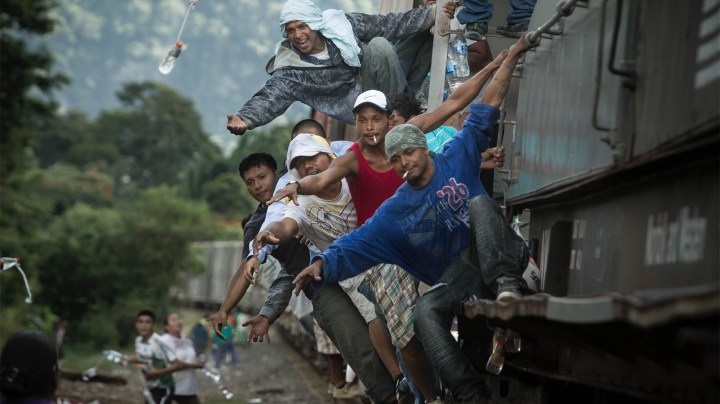Portrait of Doña Leonilda Vázquez. She, her daughter and other 13 women founded the group known as Las Patronas in 1995. Their mission is to provide free food for undocumented migrants crossing Mexico between the Tierra Blanca and Córdoba train stations.
PHOTOS: An Intimate Look at Las Patronas, the Mexican Women Who Feed Migrants Traveling on La Bestia

Photo: Hans-Maximo Musielik for Remezcla
Several times a day, long freight trains known as La Bestia pass through the small Mexican town of La Patrona, heading north to the United States. Perched atop these trains are hundreds of men, women and children from Central America and Mexico, who hitch a ride to the border hoping to start a new life in the United States. Along the way, they risk kidnapping, injury, rape, extortion and murder.
It’s not an uncommon sight – particularly as the number of Central Americans fleeing violence in their home countries has led to a full-fledged refugee crisis. And La Patrona would be no more remarkable than any of the other small towns that the trains rumble through every day, if it weren’t for a group of women whose compassionate act of kindness turned into a movement that has garnered international attention. Las Patronas, as they’ve come to be known, are a group of women who have dedicated themselves to giving out food and water to hundreds of migrants riding the train every day. An initiative begun by Norma Romero twenty years ago, they are now a group of 15 who prepare large portions of rice, beans, bread, and water to toss to the US-bound migrants. For those riding the train, passing through La Patrona is one of the few bright spots in what is an otherwise arduous and life-threatening journey.
In 2013, Norma Romero was given the Human Rights Award by Mexico’s National Commission of Human Rights for her work with Las Patronas. The group has also been the subject of a documentary called Llévate mis amores. Below, get an intimate glimpse at their important work, in this photo essay from our contributor Hans-Maximo Musielik. – Andrea Gompf
Antonia Romero in one of the food warehouses in Córdoba, selecting fresh tomatoes used to make the salsas that they serve as side dishes for the migrants’ food rations. Some provisions are bought, although most food is donated by local businesses and supermarket chains.
Cleaning beans. Every day, prior to cooking 20 kg beans, each bag needs to be checked for tiny stones; an exhausting job that involves sorting bean by bean.
A Patrona stirs rice.
Doña Lupe fills bags with freshly cooked frijoles. Even though some days there are some left overs, every day about 20 kilos of rice and beans are cooked.
A migrant reaches as far as he can trying to grab the bag of food offered by one of the Patronas.
Undocumented migrants hang from the train known as La Bestia, as they reach for bags of food and refilled water bottles thrown at them by Las Patronas. Water bottles are strung in pairs for easier catching.
Antonia Romero, a Patrona, is left with two food bags in her hands as an empty train passes. Not all trains that pass carry undocumented migrants.
A Patrona stores leftovers in a refrigerator. Nothing is wasted at the shelter. In order to calculate the daily food needed, las Patronas communicate with the Tierra Blanca train station, where information on the number of migrants departing is given to them.
When migrants at Tierra Blanca board the trains, most already know that further up the trail Las Patronas are waiting for them with something to eat. Migrants see them as mother figures and compare them to saints. Las Patronas are amongst the few satisfactions that make them smile on their trip to the US.
A migrant smiles at the camera. Many migrants know that photos taken and published by journalists may come to be seen by their relatives in their hometowns.
Doña Tere hangs sheets at Las Patronas’ migrant shelter. Besides feeding undocumented migrants, they also offer a safe roof over their heads, which multiplies the workload of the group.
Samantha (volunteer) hands a migrant a bag with food. Sometimes, the train conductor slows down significantly while passing through the Las Patronas. This makes it easier for migrants to catch food bags being thrown at them.
A child plays along the train tracks. The train’s daily presence is part of the landscape he’s grown up accustomed to.
A volunteer carries water bottles back to the Las Patronas’ shelter.
Samantha (left) and Victor (right), two young volunteers, lie exhausted after a day’s work. Many volunteers come to Las Patronas to offer help with daily chores.